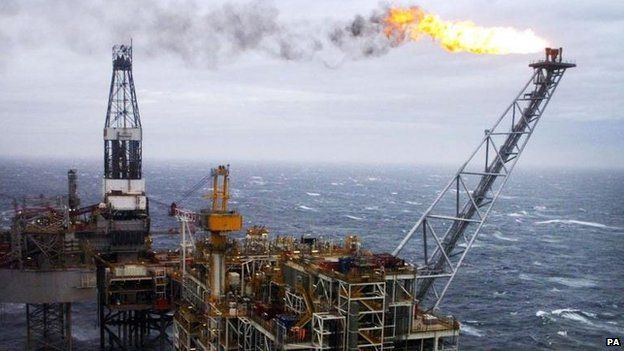Brent oil price falls below $59 a barrel
- Published

The price of Brent crude oil has fallen below $59 a barrel for the first time since May 2009.
After dropping below $60, the Brent price then fell to $58.50 a barrel, before recovering slightly to $59.01.
Oil prices have now nearly halved since June as a result of waning demand and increased supplies.
The latest fall was triggered by news of a fall in industrial activity in China, the world's second largest consumer of oil.
The price of US crude fell by $1.86 to $54.05 a barrel.
The drop came as members of oil cartel Opec reiterated that they would not try to shore up plunging oil prices by reducing production.
"We need to watch the market closely, but it will settle eventually," Qatar's oil minister, Mohammed al-Sada, said.
Russian energy minister Alexander Novak had the same message.
"If we cut, the importer countries will increase their production and this will mean a loss of our niche market," he said.
The comments came a couple of days after the world energy watchdog, the International Energy Agency, cut its oil demand forecast for 2015.
Meanwhile, credit ratings agency Standard & Poor's lowered its oil price assumptions to $70 a barrel for Brent in 2015 and $75 a barrel in 2016.
It blamed "relatively unconstrained supply and weaker demand" for the downgraded forecast.
Rouble rout
While lower oil prices could provide a boost to many economies through cheaper fuel, the sharp drop in the cost of crude is affecting many oil producers.
On Tuesday, Russia dramatically increased its interest rate from 10.5% to 17% in an attempt to halt the slide in the country's currency, the rouble.
The rouble has lost 50% against the US dollar this year as falling oil prices and Western sanctions continue to weigh on the country's economy.
However, early signs were that the attempt to defend the currency had failed, with the rouble hitting fresh lows against the dollar.
Investment hit?
With high levels of output from the US and no sign of a sustained economic recovery in Europe, most experts believe prices will remain low for the foreseeable future.
However, the low cost of crude may also make investment in some new wells uneconomical - which means prices could rise in the longer term.
Goldman Sachs has estimated that about $930m of investment in new oil projects could be hit, given the recent plunge in oil prices.
Without this investment, new oil output could be cut by about 7.5 million barrels a day by 2025, or about 8% of current demand, the bank estimates.
- Published19 January 2015
- Published10 December 2014
- Published16 December 2014
- Published14 December 2014
- Published11 December 2014
- Published7 December 2014